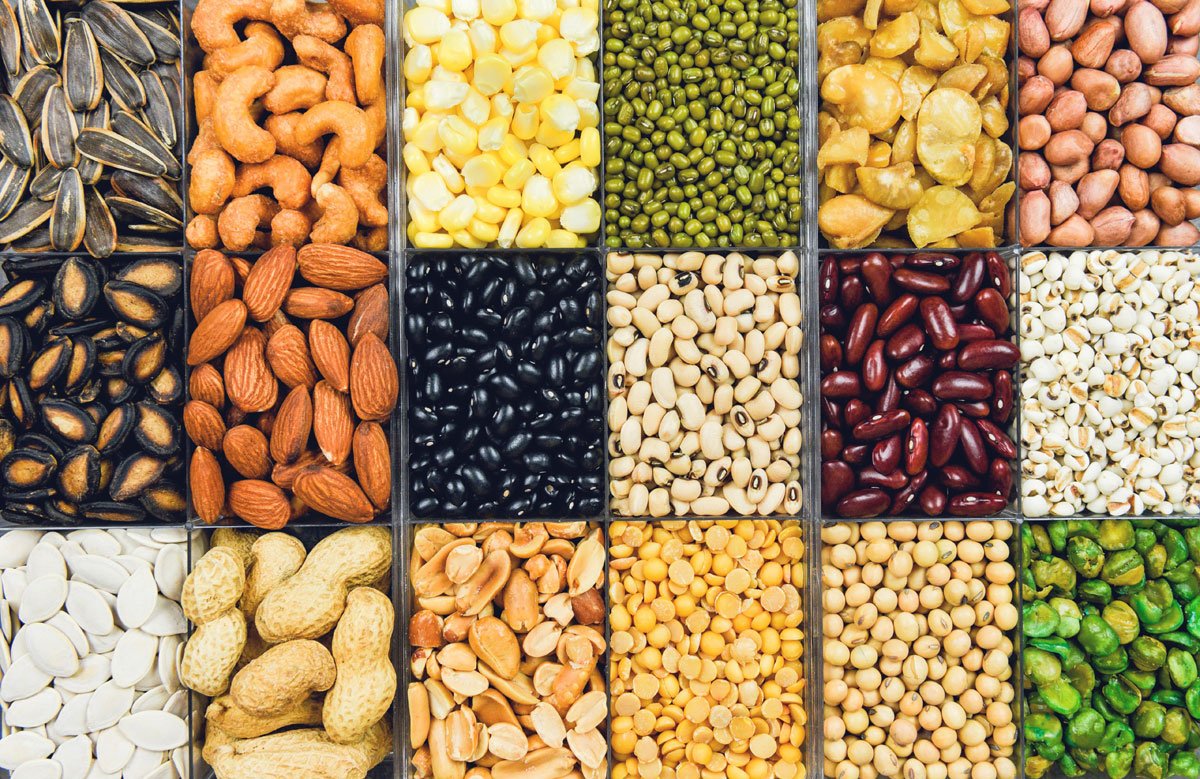The Power Trio: Exploring Legumes, Nuts, and Grains for Optimal Nutrition

Certain food groups stand out for their immense health benefits in the realm of nutrition. Among these, legumes, nuts, and grains form a triumphant trio, offering a wealth of nutrients and culinary versatility. From providing essential proteins to delivering complex carbohydrates and healthy fats, these plant-based powerhouses have earned their place as staples in diets worldwide. Let’s delve into the nutritional prowess of legumes, nuts, and grains and explore why they deserve a prominent spot on your plate. And don’t forget to check out where legumes, nuts, and grains belong in Our Rating System.
Legumes
Protein Powerhouses Legumes, encompassing beans, lentils, peas, and chickpeas, are renowned for their high protein content, making them a favorite among vegetarians and vegans. Beyond protein, legumes contain dietary fiber, vitamins, and minerals. They are particularly rich in folate, iron, potassium, and magnesium, essential for maintaining overall health and well-being.
-
- Protein: Legumes provide a substantial source of plant-based protein, crucial for muscle repair and growth. They offer an excellent alternative to meat for those seeking to reduce their meat consumption.
- Fiber: The soluble fiber in legumes helps regulate blood sugar levels and promotes digestive health by preventing constipation and promoting the growth of beneficial gut bacteria.
- Antioxidants: Legumes contain a variety of antioxidants, such as flavonoids and polyphenols, which help reduce inflammation and protect against chronic diseases like heart disease and cancer.
Nuts
Nutrient-Dense Energy Boosters Nuts are nature’s bite-sized nutritional powerhouses, offering a plethora of nutrients in every crunchy bite. From heart-healthy fats to muscle-building proteins and an array of vitamins and minerals, nuts are a convenient and delicious way to boost your overall nutrient intake.
-
- Healthy Fats: Nuts are rich in monounsaturated and polyunsaturated fats, including omega-3 fatty acids, which are beneficial for heart health and may help lower cholesterol levels.
- Protein: While not as protein-dense as legumes, nuts still provide a significant source of plant-based protein, making them an excellent snack option for vegetarians and omnivores alike.
- Vitamins and Minerals: Nuts are loaded with essential vitamins and minerals, including vitamin E, magnesium, selenium, and zinc, which play key roles in immune function, energy metabolism, and cell repair.
Grains
The Foundation of a Balanced Diet Grains, such as wheat, rice, oats, and barley, have been a dietary staple for centuries, providing a reliable source of energy and nutrients for civilizations around the world. While refined grains have gained a bad reputation due to their low nutrient content, whole grains offer a wealth of health benefits.
-
- Complex Carbohydrates: Whole grains are rich in complex carbohydrates, which provide a steady source of energy and help regulate blood sugar levels, keeping you feeling fuller for longer.
- Fiber: Whole grains are an excellent source of dietary fiber, both soluble and insoluble, which aids in digestion, promotes satiety, and helps prevent constipation and other digestive issues.
- Nutrients: Whole grains are packed with essential nutrients, including B vitamins, iron, magnesium, and selenium, which are vital for energy production, red blood cell formation, and overall health.
Incorporating Legumes, Nuts, and Grains Into Your Diet
Now that we’ve explored the nutritional benefits of legumes, nuts, and grains, you may be wondering how to incorporate these power foods into your daily diet. Here are some simple and delicious ways to enjoy them:
- Add beans or lentils to soups, stews, salads, and casseroles for an extra boost of protein and fiber.
- Snack on a handful of nuts or seeds between meals for a satisfying crunch and a dose of healthy fats and protein.
- Swap refined grains for whole grains like brown rice, quinoa, or whole wheat pasta to increase your intake of fiber and nutrients.
- Experiment with different legumes, nuts, and grains in your cooking to discover new flavors and textures and keep your meals exciting and nutritious.
Legumes, Nuts, and Grains are Definitely People Chow
Legumes, nuts, and grains are nutritional powerhouses that offer a wide range of health benefits, from supporting heart health and aiding digestion to providing essential nutrients for overall well-being. By incorporating these plant-based foods into your diet regularly, you can optimize your nutrition and take a step toward a healthier, more balanced lifestyle. So go ahead, embrace the power of legumes, nuts, and grains, and let them fuel your journey to better health and vitality.

